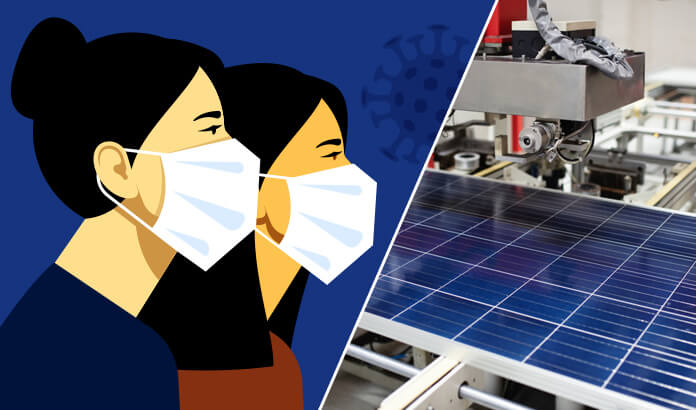Coronavirus Hits Photo voltaic Panel Market
Solar panels prices, production, and supply are poised to continue to be in turmoil in the midst of the Coronavirus outbreak.
The Coronavirus Disease (COVID-19), a respiratory disease that first appeared in China, has a reported 90,870 cases, including in the United States, according to WHO. There have been 3,112 deaths worldwide associated with the Coronavirus. Nine people have died in the United States alone from the virus, according to The New York Times.
While the primary concern is the health and wellbeing of the populous at large, there’s no denying that the Coronavirus is also beginning to wreak havoc on the stock market and economies across the world—and the solar sector is not exempt.
Since the outbreak continues to rapidly spread, the United States’ stock market has dipped to its worst point since 2018. Industry thought leaders fear that solar prices and stocks are not far behind.
How solar is affected
Contents
Chinese citizens have been in a mandate lockdown in hopes to combat the spread of the disease. This means manufacturing plants and businesses sit vacant or not fully staffed, including solar panel production facilities.
The majority of the United States’ and the world’s solar panel production hails from China. For weeks no one was going to work, but now slowly workers are returning. Still, manufacturers won’t be operating at full capacity which can slow and delay production targets.
“If you look at it 60 to 70 percent all solar production comes out of China,” said Clark Sackschewsky
, national leader of BDO’s Natural Resources practice. “So if China is closing manufacturing facilities, this means fewer exports in all industries. The solar panel industry will be affected greatly.”
Slowed production can lead to pausing and delays of large products, an increase in solar panel prices, and companies not being able to fulfill installations. Battery production is also likely to be affected, as China is the top producer of these, as well.
Some of China’s top solar manufacturers include Trina Solar, China Sunergy, Suntech Power, Canadian Solar, and JA Solar Holdings.
Trina Solar declined to comment for this story through a representative. Candian Solar did not respond to request for comment, nor did Suntech Power in time for publication of this article.
Stock market plummet, solar up and down
The Federal Reserve cut interest rates on March 3 in an attempt to protect the stock market as a whole. Stocks momentarily rebounded, but then dipped again.
These market reactions stem from China’s power in the world economy. Even behemoth American companies are facing large potential losses. In late February, Apple reported it would not hit its quarterly projections because of manufacturing issues in China.
“The solar industry will be in lockstep with everyone else being affected,” Sackschewsky said. “They’re no getting the Coronavirus priced into stocks, which it wasn’t before, and now there’s an adjustment.”
Canadian Solar (CSIQ) was up on March 3 by 3.3 percent, by described as “bearish” in the short term by Yahoo Finance.
Suntech Power and Trina Solar are private companies. China Sunergy is not on the United States’ stock market.
“If you have a supply chain or do business with China it’s affecting the top and bottom line,” Sackschewsky said. “An adjustment will be expectations there’s nothing a business can do to protect other than seek a new supplier, and that may affect the cost.”
Prices predicted to rise
The Coronavirus outbreak in China has created a shortage of solar wafers and module glass, meaning it’s harder to build the solar panels. For companies that want to finish solar installations on time or promised homeowners a roof-top installation within three months before summer begins, demand and prices will rise.
Sackschewsky said this can end up delaying residential projects and forcing companies to tightly manage cash flow while the virus’ outbreak continues.
Alternative U.S. solar options
The spread of the Coronavirus in the United States is still in its infancy as officials strive to contain the spread. While it remains unseen how the virus will affect work here in the United States, there are some home-grown options for solar panel production.
Companies such as Tesla and Panasonic have a facility in Buffalo, NY, Solar Tech Universal in Riveria Beach, FL, and Mission Solar in San Antion, TX, to name a few, have large footprints in the United States. However, as demand increases, prices could go up.
There’s nothing that United States-based solar companies can do about the supply chain issues from China, however, there are steps they can take internally to protect against the backlash the virus will cause if it continues to linger, Sackschewsky said.
Companies can temporarily try to switch solar panel suppliers to companies based in the United States. They can also accept that some projects might be delayed, and work to refinance and adjust the schedule accordingly. For residential solar companies, they may have to dip into any supplies of panels they have and re-adjust customer expectations for how long it will take for a home array will be installed.
As for handling their workers, companies should encourage sick employees to stay home and order anyone who has traveled to countries with an outbreak to self-quarantine for 14 days upon returning.
“It’s one of those things in the US we have to be diligent and pay attention to what’s happening,” Sackschewsky said.
I think as long as we continue to monitor what’s happening from a global standpoint and in the US, when this gets under control, then it will go back to business as usual.
Other energy sources equally as affected
In the energy world, it’s not just the solar industry that is infected by the Coronavirus.
Sackschewsky said the oil and gas industry is already seeing reductions in shipments from China and not enough pipe is being shipped or other raw materials used for drilling and construction. This is resulting in a slow down of oil and gas projects. So oil and gas will not be a better alternative to solar in the interim of the virus’ outbreak.
How will it end?
Some workers are being ordered back to work in China and the rapid spread of the virus seems to have slightly slowed. However, there currently is no vaccine or treatment, but the American pharmaceutical companies are working to create, produce and test one.
“Will it (the coronavirus) harm it (solar) forever? No. But will slow it down,” Sackschewsky said. “The coronavirus isn’t going away anytime soon if anything it has expanded.”



